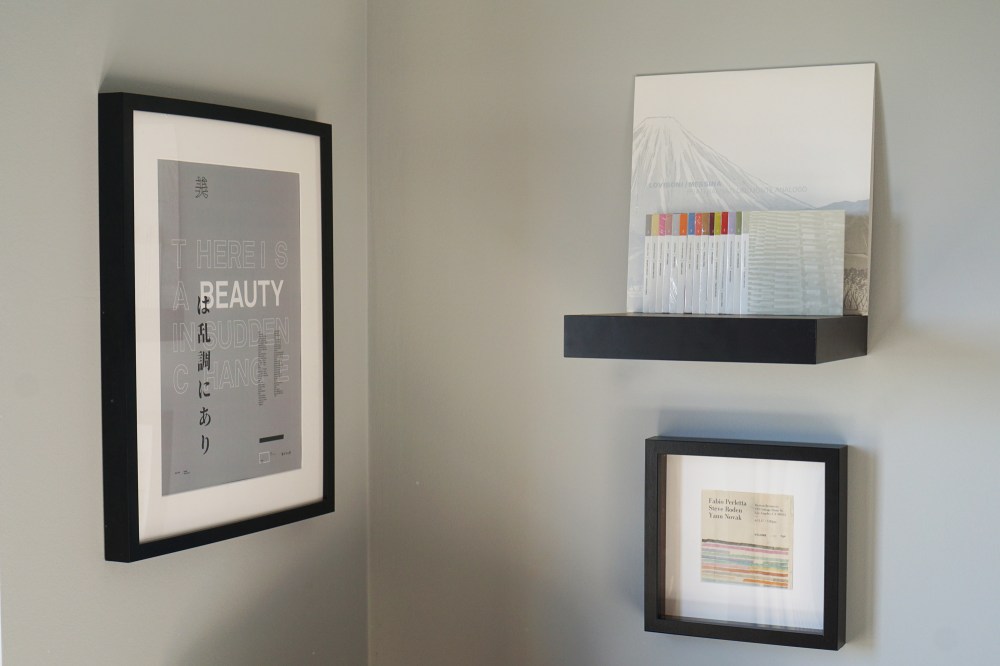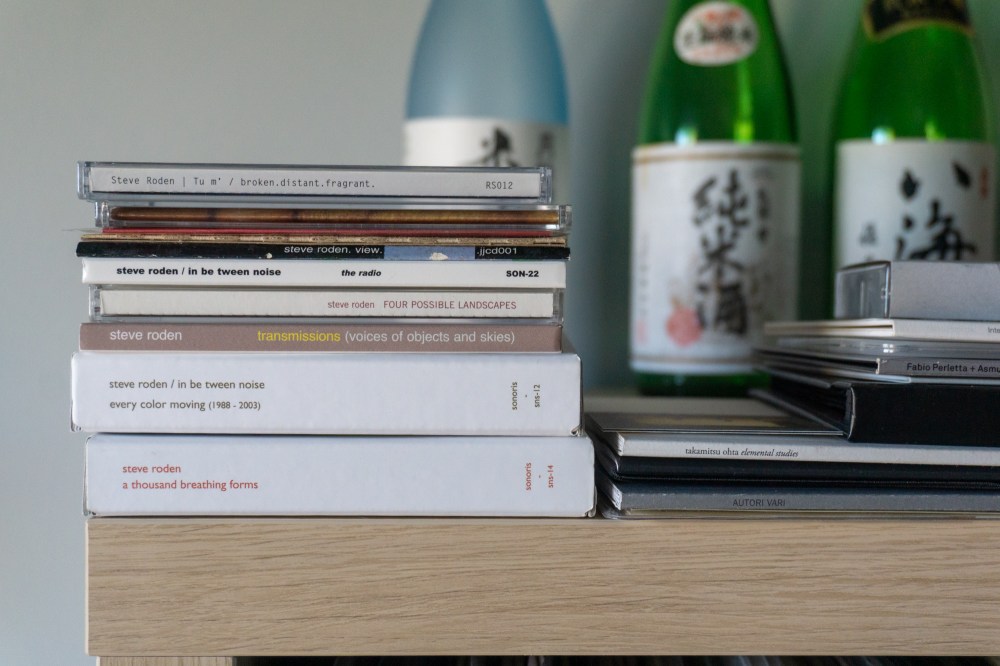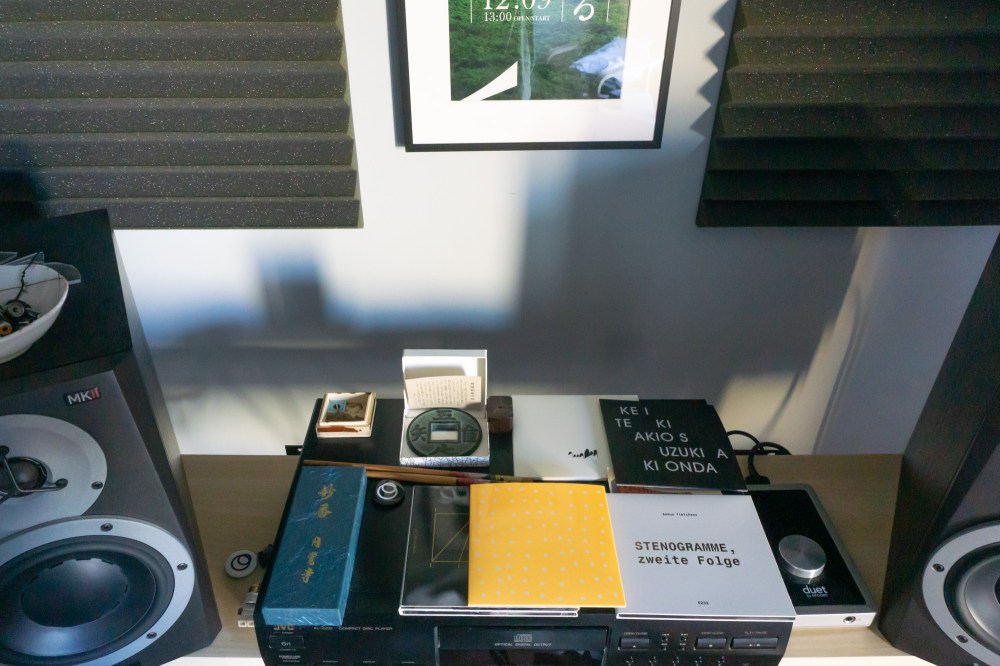Minimalism and order. These are the main words that come to my mind when I see this picture of the posters, and the empty spaces between things you seem to like. Both visually and musically you seem to go in this direction. What drove you there? Yan Jun said here on our blog a funny thing about that: “Minimalism in art is already corrupted. Don’t you think it smells very bourgeois nowadays? And sometimes it takes too much money and power to be minimal. This is not fair. So I’d say I just like simple music.”
I do like spaces. I am fascinated by the unseen, unheard, unsaid because it triggers my curiosity. I am such a curious person and I have many passions besides art and music like tea and the vegetal world in general. I like to let things breathe, that’s the main reason why I use silence or near-silence moments in my compositions. Silence is really fascinating for me. Like a blank paper it could be anything or just itself, nothing more than a blank paper. In graphic design it’s the empty space which really communicates, in a movie the off-camera says a lot, in architecture spaces create and expand our senses and perception. A couple of years ago, thanks to my friend Luigi Turra, I got interested in the architecture of Tadao Ando, which really opened up my mind in terms of how I think sound now. That was such a crucial discovery for me. Luigi and I have created a project inspired by the fundamentals of Ando’s work, sculpting the sounds in relation to the concept of ‘Ma 間’, the Japanese complex notion of space. Music as a space then. Music as pause. Music as silence.
I read that interview with Yan Jun. I honestly didn’t really understand what he was meant to say, but I generally agree with him that art is corrupted. Everything gets corrupted once it’s being sold and when there are involvements far beyond the art itself. Nowdays it happens too often that power or tendencies stand above the music itself. Anyway, it’s quite hard to define what minimalism is, I can just say I like a minimalistic approach because it makes me focus more on a specific theme or concept. But in my case that doesn’t necessarily mean the result is minimalistic though. Think of a flower: one of the most beautiful example of seemingly simplicity that hides complexities.
Well, I think that Yan Jun meant something about the message that goes with music. As far as I can guess, the point is that often minimalism is associated with a more ‘cold’ and abstract/symbolic aspect. Nowadays, some artist says that a more direct and perhaps political commitment has to pass through music or other forms of expressions. That’s why (I suppose) the pure minimal art is considered bourgeois by Yan Jun… For instance, in another conversation with Mark Nelson of Labradford and Pan American, he’s saying that “In general, I think the times call for a bit of a more direct approach.”
Well, this makes me feel even more confused about this topic! Ah ah, it’s not your fault though, it’s just complicated to answer these questions. There are too many levels to analyse. What I can say is that minimalism to me is not only about content, rather the process. And I totally disagree about being more direct when it comes to making art. I’ve never liked direct things in art. I am not interested in making things easier. Still, I like things to be discovered because they make your brain work, and start a process of understanding. That’s very creative!
You know when I see a sculpture or listen to a piece of music and you immediately feel the urgency to turn on the laptop or other instruments to make something new? That’s when I can say art is interesting. It moves, it’s an organic entity. Art to me is (almost) never direct, even when it seems to be direct, because there’s always a shift from a context to another, for example from the composer to the listeners. I don’t like to express something with an immediate understanding, I just would like people to be more active and less brainwashed. I like slow and imperceptible things. Changes happen slowly. We totally got out of the habit of waiting. I like subtle things, but if you mean to be more spontaneous, I totally agree with you.
Three empty bottles of some Japanese liquid, and the LP of Neu! I think that your love for Japan is known, but how did you discover it, why do you love it so much? Do you also have any fascination for Germany and krautrock somehow? Looks at the zenith of Japan, but not that much…
Oh, that’s Japanese sake. I think the love for Japan dates back to my early age when we used to watch anime, do you remember that? My favorite one was Lupin! There was a turning point in my life though: when my uncles came back from their honeymoon in Thailand they shared their pictures (diapositives to be precise!) with my family, and that was really great. I still remember that evening. That’s how my interest for Asian culture was born. Then when I was at the university in Rome, I slowly started getting interested in tea and that’s how I discovered Japanese culture. I bought my first sencha at my friend Alessandra’s Te e Teiere tea shop. I have been drinking Japanese sencha everyday for 10 years or so! Japanese people have a word to describe precise concepts, things or actions. They contemplate little things in a way so detailed and respectful. I go crazy about details. I could stare at an object for hours and hours, studying every nuances of its matter, shape, color.
Yes, in the early 2000 I had a strong interest in what is commonly called krautrock or kosmische musik. Bands like NEU!, Faust, the very first Tangerine Dream until Zeit, Holger Czukay & Can, Cluster were some of my biggest influences. I bought my first synthesizer at that time, a Roland Juno 106, and made music with it under those influences. I came from different listenings, and was totally into 80’-90’s NYC stuff, like Glenn Branca, Sonic Youth, Suicide, DNA. I remember the first time I listened to the first NEU! album, it really blew my mind. Their approach was truly innovative and I think that stuff is still very contemporary.
I like this focus on details, I think it fits with your music approach. I think it can be said also of Steve Roden, whose CD you seem to love a lot. Tell me about your meeting and the work you’re doing with him.
Steve gave me most of those CDs as a present! He is one of the most incredible people I’ve ever met in my life. His stuff influenced me a lot before, but when we met I really understood the core of his work. I met him in Pasadena, California, during my residency in Los Angeles at VOLUME. We first met at Pasadena Art Council (now Fulcrum Art) and then he drove me to his wonderful bubble house, designed by architect Wallace Neff as a solution to the mid-twentieth century global housing crisis. It’s the only remaining airform house in the United States. The house is very cozy and full of his drawings, paintings, objects of any kind and Danish mid-century furniture. We spent much time together, from mid morning to late afternoon, having lunch, visiting his studio and talking about music, art, life, tea. We are working on a release on my 901 editions which I hope will see the light later this year or in 2020. I cannot say more now… Steve is such a funny, honest and authentic person, really inspiring in his way of being always curious and open-minded, never in compliance with rules, besides his own. He has no musical training, having studied painting and visual arts, and this is evident in the way he explores things, processes and so on. He’s pure. His level of openness is very wide. He likes to play with things and mix them together, blending approaches from different fields (for example painting and music). I’ve been listening, watching, and studying his stuff for more than 10 years and I still love trying to make sense of it, and find my way in it… I can say he’s a sensei (and for many other artists!). Our meeting was truly enlightening for me. We had such a great time together and I miss him.
You mentioned politics before, and I see here, among the LPs, “Creuza de Ma” by Fabrizio De Andrè. Can you tell me about that record?
I’ve always liked the work of Fabrizio De Andrè, his way of being courageous and honest. The themes he dealt with are still current topics, and there’s a sense of great openness: the dialect from Genoa – the language used for the album – absorbed many words from different languages like Arabic, Spanish and French, being one of the main language used among sailors in the Mediterranean basin. This demonstrate the power of cultural exchange, diversity and tolerance which are widely missing nowadays… De Andrè loved the minorities, marginalised people, and he had the gigantic merit to look at them on another perspective, proving there’s good even where apparently there’s not. There’s also another record from him I really love which debates around those themes and it’s “Anime Salve”. He was a poet. Anyway, I cannot resist to report a comment from a guy on Salvini’s recent commemorative post about De Andrè’s death: “your heart is too close to your asshole”, quoting De Andrè’s song “Un Giudice” (A Judge).
I see Akio Suzuki records, and I see that you recently relaunched 901 Editions, your label. Sounds a little bit crazy or just brave to publish music nowadays, but – as can be clear from this blog – I truly believe in the importance of the physicality of records. By the way, why did you restart? How is it now going?
I am very proud of Akio Suzuki’s album and it’s a special one! I’ve been following his work for a long time and it’s such a huge inspiration for me. I cannot believe I finally managed to release “Resonant Spaces” for the very first time and I would say that I was pretty lucky that nobody released it before. To those who are not familiar with this project “Resonant Spaces” was a tour with Akio Suzuki and John Butcher arranged in 2006 by the Arika organisation in some of the remotest regions of Scotland. They organised a series of site-specific performances in natural, prehistoric, manmade and industrial locations including amazing places for acoustics like Smoo Cave and Hamilton Mausoleum which has a reverberation decay of 15 seconds. I am very determined when I trust a project, and I can work no-stop until it sees the light. It took one year work, but it was totally worth the effort.
I restarted the label because I like to curate projects and I wanted to explore more than I did in the past. The label for me is a challenge and people often identify it with me. There’s a lot of myself in it. I agree with you that releasing music physically is important. The digital world made us lazy and I honestly got very tired of all this virtuality. This year I have organised three label parties and an exhibition in Milan, London and Tokyo. I sold records, met incredible people, share thoughts, had fun. This is very important especially nowadays with streaming that takes over. Physical releases have a different process and all the care behind makes them inevitably more valuable. I like this sense of community, where artists trade their albums. I traded most of the records I have, and each one has its own story. That’s fantastic and couldn’t happen with a file. Running a label it’s not an easy task, I do everything alone from what concerns graphic design (with the help of my business partner Davide at Mote Studio), planning, distribution, writing the press release, managing orders and so on… My friends Lorenzo Balloni and Luigi Turra help me make decisions quite often. That being said, I am very overwhelmed by the support I received on the kickstarter campaign, many people I didn’t know and artists I respect shared the campaign, contributing to make the relaunch great! Stay tuned for the October releases…
Fabio Perletta is a sound and installation artist living and working in Italy. In his work he investigates notions such as presence, silence and impermanence, encouraging different levels of experience, engagement and contemplation. Being concerned with matter and immaterial, his research is focused on duality, letting paradoxes coexist. Perletta’s practice reveals an inner discipline which goes beyond the scope of rational coordinates, whilst addressing reality and small things.
fabioperletta.it | 901editions.com









